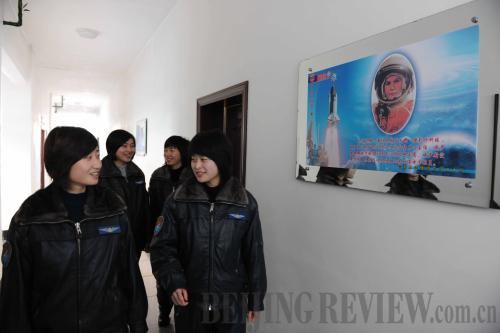|
Female astronauts
 |
|
FUTURE ASTRONAUTS: China's first batch of female astronaut candidates are selected from airforce pilots (CFP) |
For the first time, China will select female astronauts to operate its manned space laboratories.
Zhang said seven Chinese astronauts, including two females, have been shortlisted for the country's space program.
The seven top-flight pilots were specially picked from 45 candidates, 30 male and 15 female, who are some of the finest pilots in the Chinese airforce. The candidates were divided into three groups, and underwent thorough physical examinations as well as psychological tests, said Zhang.
"During the selection process, we had almost the same requirements for female candidates as for male candidates, with the only difference was that they must be married, as we believe married women to be more physically and psychologically mature," he said.
He said women astronauts theoretically enjoy advantages over their male counterparts in terms of endurance and cautiousness.
The vetting process for the country's future astronauts is an exacting search for "the perfect human," said Xu Xianrong, a doctor with top-rated Air Force General Hospital who participated in the selection process.
For example, since astronauts in flight must adjust to weightlessness, it is preferred pilots are endowed with superior vestibular systems—a tiny part of the auditory system located in the inner ear which contributes to the bodily functions of balance and equilibrium, Xu told the Xinhua News Agency.
"Of course, requirements are different for spacecraft pilots and communicators," he said.
Regarding the criteria only mothers be permitted to serve as female astronauts, Xu said, "this is out of the consideration of being responsible for female pilots."
"Although there is little evidence on how space travel can affect the female anatomy, we have to be especially cautious. After all, this is unprecedented within China," he said.
Lunar probe
Meanwhile, China has also accelerated the pace of its moon exploration mission.
China will send Chang'e 3 and a lunar rover to the Moon in 2013 at the earliest, said Ye Peijian, chief designer of the country's first moon probe and member of the Chinese Academy of Sciences, on April 10.
Chang'e 3's mission will be to achieve a soft landing and probe the surface of the moon. The lunar rover will bear the brand Zhonghua, meaning "China," said Ye.
Before this mission, Chang'e 2 will be launched in October of this year to test key technologies for soft landing as well as reduce technical risks, said Liang Xiaohong, Deputy Director of the China Academy of Launch Vehicle Technology.
The satellite will be launched on a Long March 3-C carrier rocket, Liang said.
The timetable for the launch was announced just as China concluded the first phase of its three-stage moon mission with a controlled impact of Chang'e 1 on the Moon on March 1, 2009.
Chang'e 1, China's first lunar probe, was launched in October 2007.
Ye said China's three-stage moon mission could be defined as "orbiting," "landing" and "returning."
A Chang'e 4 will also be launched during the second phase, which will conclude before 2017, he said.
The third phase will last from 2017 to 2020, Ye said.
Major Events of China's Space Program
October 8, 1956 An institute on missile and rocket research is set up, the first of the country.
July 19, 1964 A biological rocket carrying albino rats is launched successfully.
April 1, 1968 An institute for spaceflight-oriented medical engineering is set up.
April 24, 1970 The Dong Fang Hong 1 scientific experimental satellite lifts off aboard a Long March rocket.
November 26, 1975 The first recoverable satellite of the country is launched.
September 7, 1988 A meteorological satellite Feng Yun 1-A is launched.
April 7, 1990 The Long March CZ 3 sends AsiaSat 1 communication satellite into orbit, the start of the country's commercial launch service.
July 16, 1990 The Long March CZ 2-E is launched, a cluster carrier rocket.
November 20, 1999 The unmanned Shenzhou 1 spacecraft is launched.
January 10, 2001 The unmanned Shenzhou 2 spacecraft is launched.
March 25, 2002 The unmanned Shenzhou 3 spacecraft is launched.
December 30, 2002 The unmanned Shenzhou 4 spacecraft is launched.
October 15, 2003 The Shenzhou 5 blasts off into space, sending the country's first astronaut Yang Liwei into orbit.
October 12, 2005 The Shenzhou 6 is launched, sending two astronauts, Fei Junlong and Nie Haisheng, into space.
October 24, 2007 The first unmanned lunar orbiter of the country, Chang'e 1, is launched.
September 25, 2008 The Shenzhou 7 blasts off, sending Zhai Zhigang, Liu Boming and Jing Haipeng into space. Zhai completes the country's first space walking on September 27, 2008.
(Source: Xinhua News Agency) | 